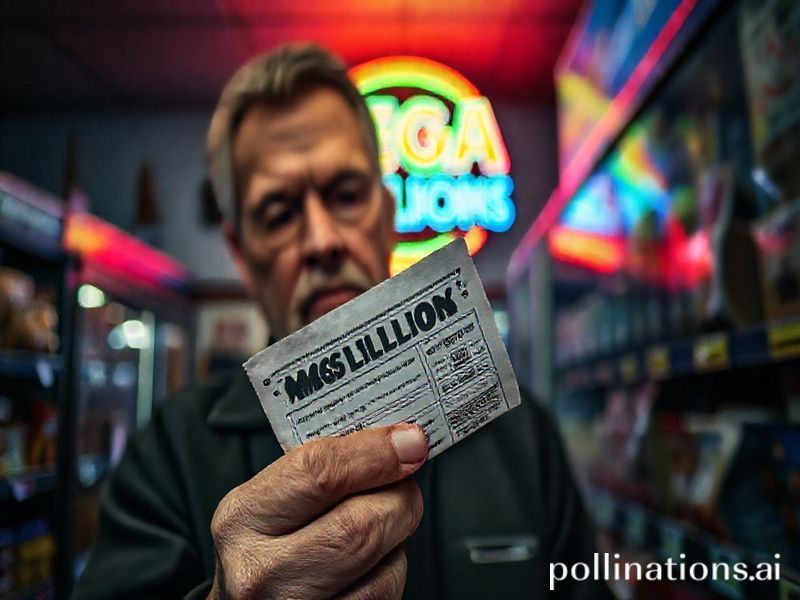mega millions
Mega Millions: How a $1.6 Billion Mirage Seduces the Planet
By Our Man in the Cheap Seats
At 11 p.m. Eastern last night, a single American lottery draw produced more overnight billionaires than most African stock exchanges manage in a decade. The Mega Millions jackpot—$1.6 billion and change—had swollen to the kind of figure normally reserved for defense budgets or Elon Musk’s divorce settlements. Yet the fever was not confined to the 50 states. From Lagos to Lahore, TikTok livestreams showed office pools stuffing PayPal receipts into Google spreadsheets, as if democracy had finally found something more inspiring than voting: the chance to outsource your destiny to a ping-pong ball.
The mechanics are elegantly stupid: pick five numbers, one “Mega Ball,” and wait to be anointed by a machine that looks like a Soviet-era dishwasher. The odds—1 in 302.6 million—are so laughably bad that statisticians prefer to describe them in astronomical units usually reserved for interstellar dust. Still, the same humans who refuse to wear seat belts on motorbikes will happily cross oceans for a ticket. Dubai’s gold souk now sells laminated “lucky” slips next to 24-karat ingots; in Manila, enterprising students run Telegram bots that accept GCash and prayers. Capitalism, ever the opportunist, has franchised hope itself.
International airlines quietly love the hysteria. Turkish Airlines reported a 12 % spike in U.S.-bound bookings the week the jackpot crested a billion. Lufthansa’s in-flight magazine ran a glossy spread titled “Win Big, Fly Bigger,” featuring champagne flutes balanced on unread Proust. Meanwhile, the U.S. Customs and Border Protection—whose usual remit is confiscating mangoes and existential dread—issued a helpful FAQ clarifying that non-residents may indeed collect prizes, though they’ll still be strip-searched first for agricultural pests and bad vibes.
The geopolitical optics are exquisite. China’s state media tut-tutted about “decadent Western gambling,” conveniently ignoring Macau’s roulette tables currently outperforming the Shanghai Composite. France dispatched a sociologist to Times Square to film slack-jawed tourists as if observing a cargo cult. He later told Le Monde that Americans worship probability the way Bretons worship butter. The irony, of course, is that EuroMillions—Europe’s own transnational lottery—rolled over last month to €200 million, prompting Italians to riot not for bread but for scratch cards.
But let us not pretend the spectacle is uniquely American. In Sierra Leone, where GDP per capita is roughly the cost of a New York hotel breakfast, WhatsApp groups pooled leones to buy U.S. tickets via a cousin in the Bronx. Should one such syndicate win, the IMF would face the delicious dilemma of adding a lottery clause to its next structural adjustment program. Picture the PowerPoint slide: “Step 1: Deposit windfall. Step 2: Buy roads. Step 3: Try not to get couped.”
Back in the homeland, winners confront a uniquely American form of enlightenment. The advertised $1.6 billion is actually an annuity; take the lump sum and you’re down to $780 million before Uncle Sam’s emotional support drones arrive. Factor in state taxes, and the final haul might merely catapult you into the lower echelons of Forbes’ list, somewhere between a mid-tier NBA star and a moderately successful oat-milk startup. Still, for a brief, shimmering moment, you are richer than the Vatican’s art budget and only slightly less powerful.
And here lies the true global takeaway: in an era when billionaires sprout like mushrooms after rain, the lottery remains the last egalitarian sacrament. Rich or poor, oligarch or Uber driver, everyone is equally screwed by the same six numbers. It is, perversely, the fairest thing America exports—more honest than democracy, less carcinogenic than fast food. While diplomats negotiate carbon credits and debt ceilings, the real international consensus forms in gas-station queues and group chats: maybe, just maybe, chaos will smile on me next.
The draw ends, the confetti cannons jam, and the world goes back to its regularly scheduled inequality. But for forty-eight hours, every border felt permeable, every dream exportable. Somewhere tonight, a goat herder in Mongolia is checking his phone again, convinced the ticket he bought via VPN is still valid. It isn’t, but the delusion ships free—and that, dear reader, is the most American miracle of all.







